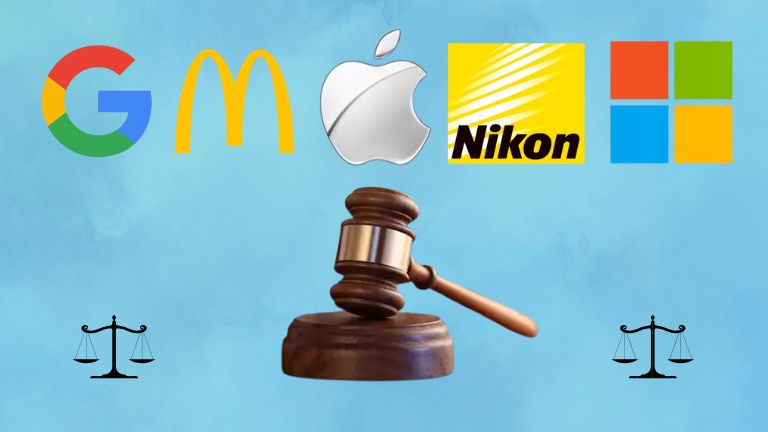
Did you know that approximately 72.2% of Fortune 1000 companies faced class-action lawsuits in 2024? Furthermore, the number of lawsuits against large organizations worldwide is steadily increasing; for example, stock market-related class-action settlements in 2024 totaled over $5.2 billion. Furthermore, Fortune 1000 companies spent approximately $4.21 billion defending class-action lawsuits in 2024. This trend is being seen in every sector, from technology to healthcare, automobiles, food, and banking. Even over the past seven years, the proportion of Fortune 1000 companies facing class-action lawsuits has increased from 59% to 72.2%. These statistics clearly show that large brands are facing legal challenges regarding their products and services. Given these statistics, let’s explore the main reasons behind this.
Challenges of Scale
There are variants of challenges that large companies have to face, such as:
Extensive Customer and Operational Networks
Large organizations have millions of customers and operate in multiple countries. Any error or security flaw impacts a large number of people. For example, e-commerce companies ship millions of orders every day; any delivery error could trigger litigation simultaneously by all affected customers. Therefore, the number of lawsuits filed against large firms is much higher than that of small or medium-sized companies.
Deep Pockets and High Profile
Large organizations are often considered “deep-pocketed” because they have the ability to compensate claims. Furthermore, their public name and image bring immediate media and public attention to any incident. For example, a data breach involving a major technology company immediately makes headlines. For these reasons, large brands are often the target of lawsuits.
Growing Focus on Safety and Conduct
According to insurance and risk experts, lawsuits involving safety or ethical conduct issues involving large organizations are on the rise. As the responsibilities of large brands grow, customers and regulators increasingly scrutinize their activities. Even a minor security lapse can spark controversy.
Legal and Regulatory Challenges
Legal and regulatory challenges are another big point that they have to address according to regional policies.
Regulatory Compliance Complexities
International companies must comply with stringent regulations in multiple countries. As new environmental or data security laws are enacted, these impose new obligations on large companies. For example, pollution standards differ in Europe and the United States; the same company must comply with regulations in both countries. Due to the complexity of regulations, even minor violations can lead to significant penalties or lawsuits.
Class-Action Lawsuits
Class-action lawsuits filed by large consumer groups or employees have become common. According to new surveys, approximately 72.2% of Fortune 1000 companies faced class-action lawsuits in 2024. For example, if fraud by a major retailer is exposed, thousands of customers may collectively approach the court. Due to the large names involved, the amount of claims in these class suits can be very high.
Technology and Data Risks
Large technology companies are facing new risks related to data breaches, privacy, and artificial intelligence. Recently, several major tech companies have reported that issues related to generative AI, data breaches, and privacy have become new legal challenges. For example, under the GDPR (European data law), data breaches can result in significant fines.
Employee and Labor Issues
A large number of employees and laborers work in big firms, so there is another chance of mistakes by them.
Labor Law Violations
The larger number of employees in large companies increases the likelihood of labor disputes. Several reports indicate that nearly one-third of companies have seen an increase in class action lawsuits related to employee wages or overtime. Furthermore, employment-related issues such as job discrimination, contract breaches, or unfair dismissal are also common in large organizations.
Management policies and disputes
Strict workplace policies and high standards can also raise issues. Large companies typically enforce strict codes of conduct and human resources policies. If an employee violates such policies or challenges a decision, they may face legal ramifications. Large organizations are often at the center of controversy in such situations.
Product and Service Disputes
If a big company fails to give satisfactory service or product, customers have the legal right to raise their concerns and seek help through online dispute mechanisms. They can also consult a business lawyer for proper legal guidance.
Product Defects and Liability
Large brands face significant liability if defects are found in their products. For example, if a large number of patients are affected by side effects of a drug, the company may be penalized with substantial compensation. Similarly, auto recalls often result in litigation. Due to the large scale of production, the claim amounts in these product defect lawsuits are also very high. Such examples have been seen in cases involving automotive and healthcare products.
Service Failures and Class Actions
Not only products, but also service failures can lead to lawsuits. Customers can collectively approach the courts if a service is not provided properly or if they receive incorrect advice from banks, insurance, or telecom companies. For example, a sudden network outage in telecom can affect thousands of customers simultaneously. The scale of services offered makes these cases more likely to attract legal claims. As seen in class-action cases involving data privacy issues involving social media platforms, it’s clear that even service failures can lead to litigation.
For all these reasons, large organizations face more lawsuits than small businesses. Larger scale of operations, broader customer bases, stricter regulatory environments, and emerging technological challenges increase these companies’ legal risk. It is important to understand that there are legal implications when choosing products or services from a large company. Considering these factors can help you take better precautions.


